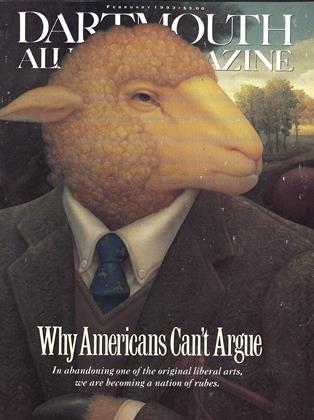"I turned back to India."
WHEN DOUGLAS Haynes left India at age 12 after living there for two years, he thought his days in India were, as they say, history. He confesses that he had not much cared for his youthful experience abroad and had been eager to leave it behind. At college he was drawn to social history but was unable to decided what region to study. When a professor suggested " that he take up non-Western history, Haynes looked to his own past: "I turned back to India."
The Indian history he explored was that of ordinary people and groups rather than great individuals and events. Trained in ethnohistory at the University of Pennsylvania, Haynes examined how local elites in Surat, a small town in western India, appropriated and transformed British concepts and vocabulary from the political traditions of the colonial rulers (you can read more about it in his Rhetoric and Ritual in aColonial Setting (University of California Press, 1991). Deflating old notions of how cultures change under colonialism, he explains, "People in any society want to change in ways that they feel are in tune with their own culture."
Haynes, who has been bringing such topics into Dartmouth's classrooms since 1983, already is well along his next inroad into Indian social history, this time with a study of artisan cloth producers, past and present.
 View Full Issue
View Full Issue
More From This Issue
-
 Feature
FeatureFor The Sake Of Argument
February 1993 By Jay Heinrichs -
 Feature
FeatureDUKE'S WORLD
February 1993 By ROBERT SULLIVAN '75 -
 Feature
FeatureRoller Screaming
February 1993 By John Morton -
 Feature
FeatureSinging for Walter
February 1993 By Sydney Lea -
 Article
ArticleThe Idealist a Leader
February 1993 By James O. Freedman -
 Article
ArticleImagining the Orient
February 1993 By Douglas Haynes
Karen Endicott
-
 Article
ArticleEducation By A Man Who Ought to Know
May 1993 By Karen Endicott -
 Article
ArticleGrade Deflators
SEPTEMBER 1994 By Karen Endicott -
 Article
ArticleSpace Politics
March 1996 By Karen Endicott -
 Article
ArticleSports Illuminated
March 1998 By Karen Endicott -
 Article
ArticleThinking About 9/11
Jan/Feb 2002 By Karen Endicott -
 Article
ArticleJapan's Ambivalent Story
OCTOBER 1988 By Mary Scott, Karen Endicott







